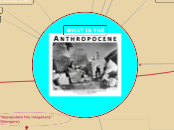EMERGENT IDEAS
From the Anthropozoic to the Anthropocene
In the 1870s Italian geologist and priest Antonio Stoppani argued for the Anthropozoic, and similar concepts have been associated with other thinkers, philosophers (and priests)
in the early 20th century.
Excerpt from Antonio Stoppani, Corso di Geologic, 1873
"now the ancient earth disappears under the relics of man or of his industry. You can already count a series of strata, where you can read the history of human generations, as before you could read in the amassed bottom of the seas the history of ancient faunas."
But only in its current formulation does it appear to have gained some scientific respectability and to have entered the zeitgeist
Today, the term is proliferating in academic discourse, across a range of scientific and applied disciplines,
as well as in the humanities and social sciences and popularised in mainstream magazines such as
National Geographic (March 2011) or The Economist
(May 2011).

Equity, relevance, purpose
A scientific concept
A way of thinking/ A sort of "ideology" / Operational presuppositions
Earth system governance
How have we reached this point?
Presuppositions
Major research findings:
• The Earth is a system that life itself helps to control.
Global change is much more than climate change. It is real, it is happening now and it is accelerating.
The human enterprise drives multiple, interacting effects that cascade through the Earth System in complex ways
Ethics of global stewardship and strategies for Earth System
management are urgently needed.
From the environmental crisis to the Anthropocène

// Biological diversity --> Biodiversity (sustain)
The science is so enmeshed in value-laden assumptions and prescriptions that ‘the Anthropocene’ reveals itself as something beyond, or other than, a scientific concept.
in that it provides the ideational underpinning for a particular view of the world, which it, in turn, helps legitimate.
Main topic
A big idea or a big fallacy ?
...?
A new human condition
A warning to the world
Nature is us
WHAT IS THE
ECOCIDE

Revisting our imaginary, our politics (technology and economy, our choises
INDUSTIAL REVOLUTION
Unequal exchange
World system theory (Wallerstein)
Dependanct theory
synthesis of world-system and environmental and historical approaches
"Knowledge/Power" (Foucault)
Revisiting the History of Earth

the key issue of the involvement of the citizens : their own autonomy and freedom :
the representatives of the people, not their educators.

a hotbed for TECHNOCRACY
What hangs on the different dating proposals ?
Geological scale
Sense of emergency
ECO-TECHNOCRACY ??!!
A technocratic eco-unit inside the technate
"
"A planet under pressure" : Planetary stewardship
